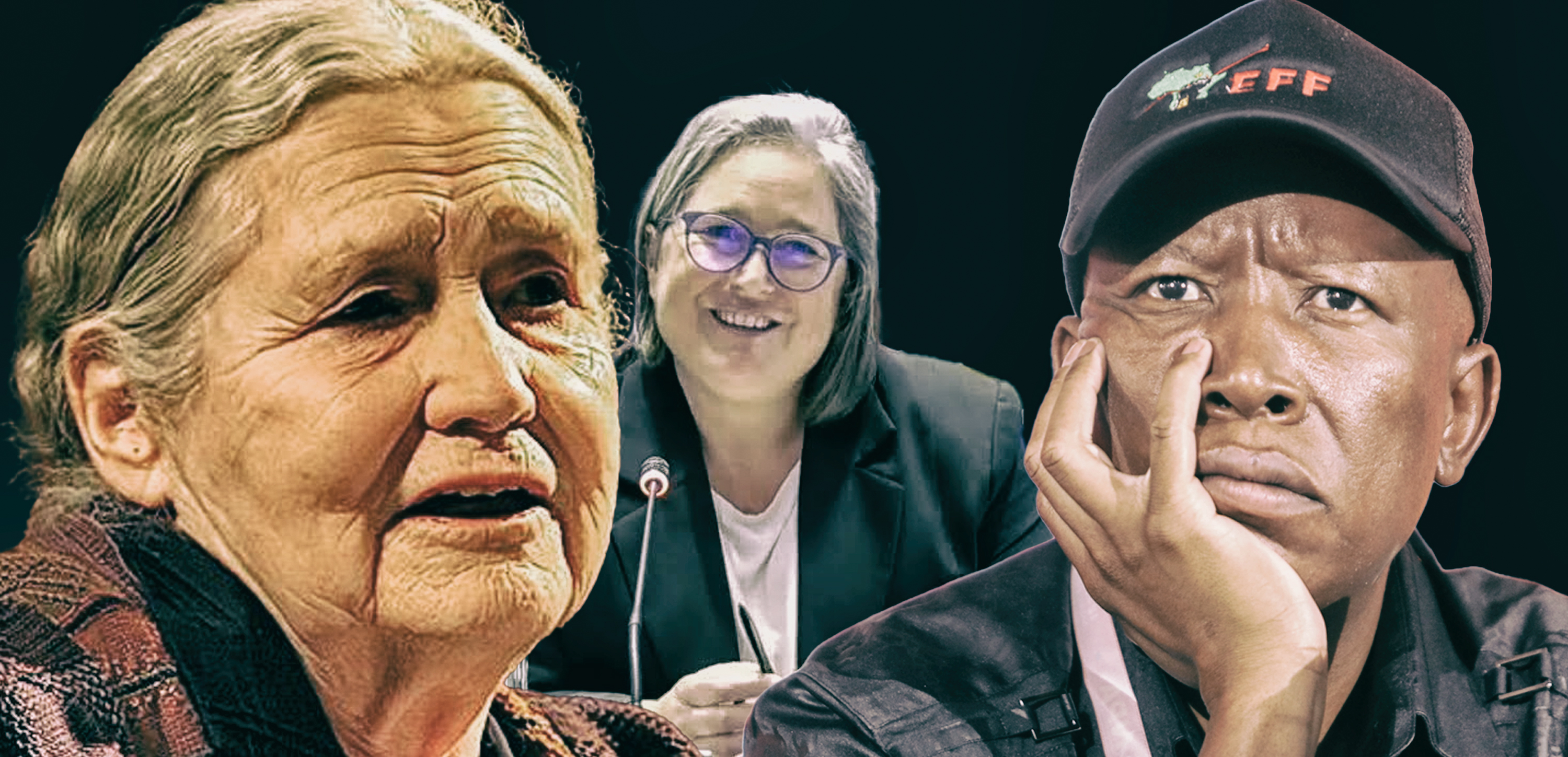During her cooking-with-gas interview with the Judicial Service Commission (JSC) for the position of deputy judge president of the new Land Court in October 2024, Judge Susannah Cowen SC didn’t mention her grandmother, the international literary trailblazer and Nobel Prize winner, Doris Lessing.
Cowen – daughter of Jean Cowen (one of Lessing’s three children) and sister to Anna, an architect and social change practitioner – follows in the footsteps of her famous grandmother who during her long life challenged the literary, political and social status quo and particularly the role of women in society.
The illustrious matrilineal history of the family runs quietly but deeply and highly effectively when it comes to Judge Cowen.
Take, for example, the approach to questions by commissioner Julius Malema at the JSC interview.
Malema’s by now classic and predictable entry point to any discussion is to get personal, even mildly so, and see what it provokes. It is a pretty good tool for testing maturity even though it is an immature approach in itself.
The optics here are also historic. The fiery leader of a self-proclaimed far-left political party with a penchant for revolutionary distribution of taxpayers’ money and savings among party leaders, questioning a white woman who is about to occupy one of the most important mechanisms for land justice.
Only in South Africa, you might say.
Yet again.
“I see you have cleared all your judgments,” Malema remarked, adding “did you do that before you came here?”
“I always try to clear my judgments. I have quite a heavy roll accumulating judgments all the time, so the approach we follow is we always try to clear our judgments,” she responded as most professionals do, with nary a hint of emotion, providing only the facts.
https://www.youtube.com/watch?v=ozQa3mOR7vY
And then on to section 25(3) of the Constitution and the “expropriation without compensation” debate. Malema asked Cowen for her views on the issue which has been a rallying point for the EFF and others for more than 30 years.
Land a ‘live issue’
In her previous JSC interviews Cowen had agreed she was happy to deal with the question at “a high level”, considering the matter would most certainly come before the Land Court.
She requested permission in this instance from commission chairperson, Chief Justice Mandisa Maya, to respond to Malema. The exchange that followed is a study of a measured, informed and expert response from an individual who has shown her commitment to fixing land reform.
Malema: “What is your take on the current Constitution and does it allow expropriation without compensation?”
Cowen: “My view is that it is a very important question that matters to a lot of South Africans and is going to have to be squarely decided by courts.
“There is no real debate about whether the Constitution, properly applied, permits nominal compensation. I cannot see how that is debatable.”
However, she added, there were other factors to take into account and which were expressly set out in section 25(3). One of these was the factoring in of state subsidies given to white farmers in the past calculated against market value.
“You can come up with a zero balance. It is a mathematical formula. Zero as opposed to nominal. I have read different arguments and I don’t know the answer,” she told Malema.
She added that there were “compelling reasons in the Constitution why there should be departures from market value compensation”. She was aware of political debates and these “are important to South Africans”, she mused.
If Malema could have spoken emoji he would have given a thumbs up, so accepting was he of the reply.
Mainstreaming land law
Anyone who has watched Cowen’s legal career, her rise to the Bench, the judgments she has penned and the manner in which she applies her academic mind, will understand that the new court is headed by competent and deeply committed leaders, including its inaugural judge president, Zeenat Carelse.
The establishment of the court marks the mainstreaming of land law, replacing the Land Claims Court which has run up a 30-year backlog which will cost R170-billion to settle, according to the Commission on Restitution of Land Rights.
Cowen has a BA (1992) LLB (1994 UCT) and a BCL (1990 Oxford UK). Before joining the Bar she worked on the Legislative Monitoring and Advocacy project of the Human Rights Committee and was a law clerk to Chief Justice Arthur Chaskalson at the Constitutional Court.
She was also instrumental – alongside the Black Sash and Idasa (Institute for a Democratic South Africa) – in initiating the Parliamentary Monitoring Group and has dedicated her legal career to the understanding and implementation of the Constitution of South Africa.
For 20 years she worked for the Legal Resources Centre in the constitutional litigation unit and was elevated to the Bench in 2010.
Opening up space for legal practitioners
A headache the Land Court has been left with, according to Cowen, is the backlog of restitution and labour tenancy claims which have been a “major problem”.
It has taken 30 years to finalise 6,000 restitution cases. There was not much that could be done, said Cowen, until the matter landed up in the then Land Claims Court.
“Truthfully, many cases are referred by indigent rural litigants who do not have access to legal representation. Once it gets referred it is difficult to prosecute.”
There were an estimated 1,500 cases “sitting there not being prosecuted, not due to the fault of the litigants but because they do not have access to legal aid”.
She was “committed to dealing with the backlog and delays” and said she hoped these types of cases would invite more interest from practitioners to get involved in land work.
“We are trying to work with [the] Legal Aid board and need to activate support from firms and practitioners. Many would love to practise in land law, and that it is a service they would want to give. We want to find a way to work with the legal profession and civil society organisations that work positively in this space”
Land and traditional leadership
Asked for her thoughts on whether land law jurisprudence extended also to KwaZulu-Natal where there is 11 million hectares of land, a third of which is under a traditional “institution”.
A simple “yes” was Cowen’s reply.
Both existing and “more pertinently our new jurisdiction”, the relevant part of which was not yet in force, would give the Land Court jurisdiction, she confirmed.
Describing Cowen as “a maverick”, the judicial transparency project, Judges Matter, sets out some of the judgments she has penned.
“In Moladora Trust, Cowen dealt with the common, racially charged conflict over livestock grazing rights between landowners (who are often white) and land occupiers under the Extension of Security of Tenure Act 62 of 1997 (ESTA) (who are often black).”
The issue in that matter had been whether the ESTA grazing rights protections applied when a landowner terminated such grazing rights through reasonable notice.
Such a termination required the ESTA occupier to remove their cattle.
“Judge Cowen found that, in light of the historical connection between land and cattle dispossession, the ESTA grazing rights protections apply. She held that the removal of grazing rights effectively amounts to an eviction, which is against the spirit of ESTA’s protection.”
This, said Judges Matter, was “a novel decision and has already started a debate in the legal and agricultural communities”.
AgriSA, which represented the interests of large commercial farmers, had come out strongly against the judgment and had offered the landowner in this case funding to challenge Cowen’s decision on appeal.
AgriSA argued that it was “a threat to commercial agriculture and national food security”.
The Women on Farms Project in turn argued that farmworkers needed livestock to survive and supplement the current low minimum wage and that there was “a systemic attempt [by landowners] to prevent farmworkers from keeping livestock”.
Cherries on top
If you need any of those – cherries, that is – this is Judges Matter’s take on the scope of Cowen’s capacity for work and to drive change.
“Since her appointment as a judge of the Land Claims Court, Cowen has been intimately involved in reforms to improve the operations of the ailing court.
“She led the auditing of old land cases and the digitisation process for the court’s registry, to allow for case flow management for restitution, labour tenants and land claim cases.”
Wait, there is more.
“She was also active in the legislative process leading to the finalisation of the Land Court Bill of 2021. She has also assisted the previous Acting Judge President with fostering mutual relations with the Ministries of Justice and Agriculture, and Legal Aid SA, and also attending the opening of Parliament in 2023.”
In an attempt to bolster the research capacity of the court, Cowen recruited legal research interns at no cost to the court, and provided training to advocate members of Pabasa on land cases and land law.
Anyone who has read grandmama Doris Lessing would know she would be very proud of her granddaughter. DM





